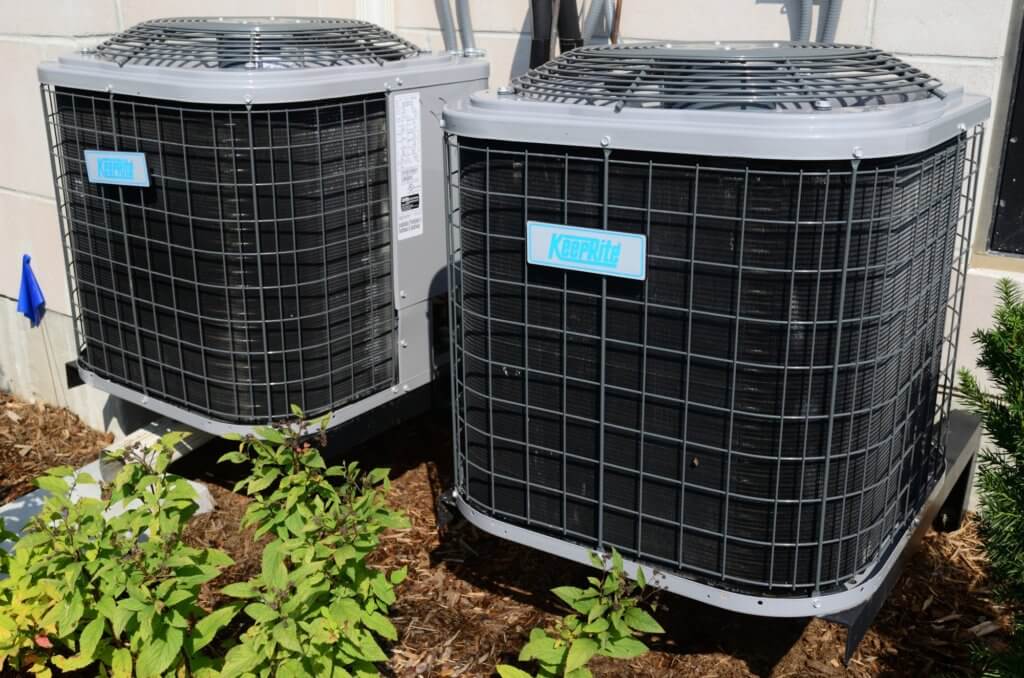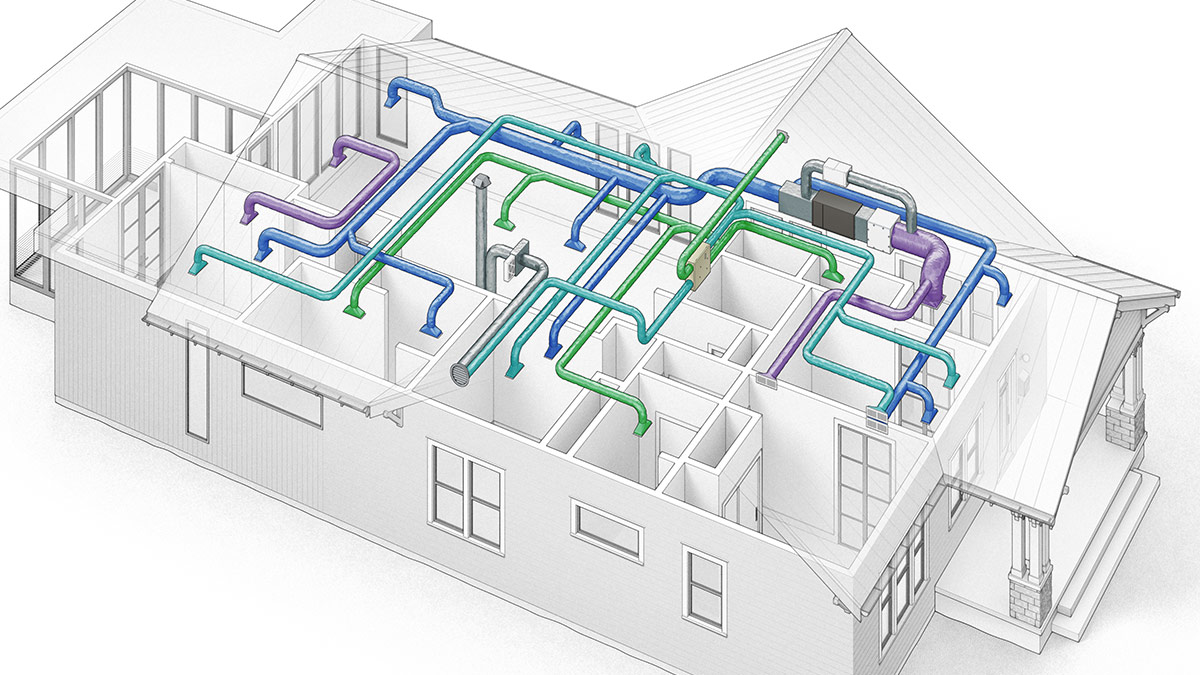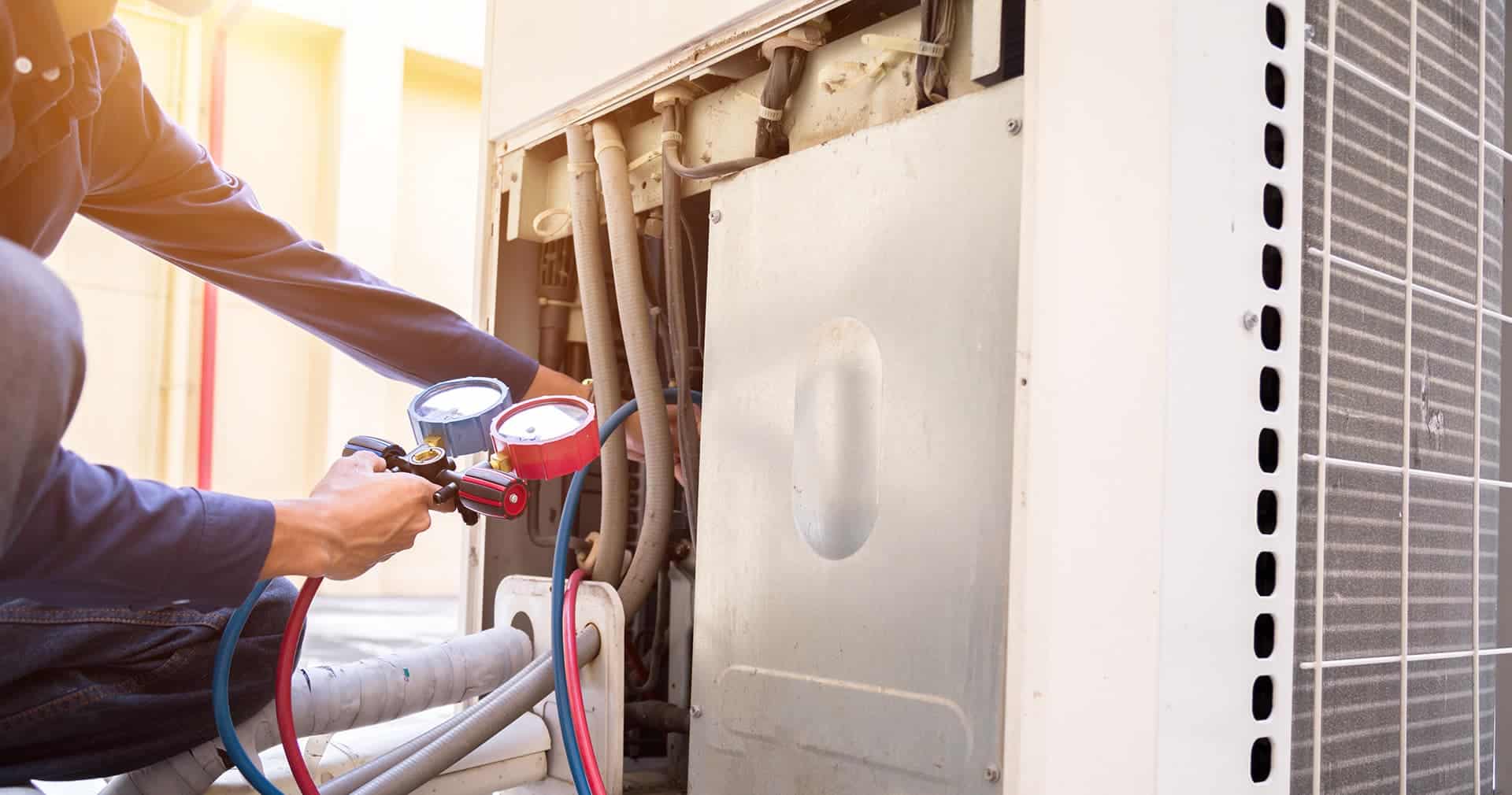Understand how HVAC experts handle large-scale system installations with precision
Checking Out the Vital Elements of an Effective Heating And Cooling System
An effective heating and cooling system is developed on numerous vital components that function in harmony. Each part, from the thermostat to the ductwork, plays an essential role in maintaining convenience and power performance. Recognizing these aspects is vital for maximizing efficiency and enhancing indoor air quality. As one examines these parts, the detailed connections between them reveal understandings right into enhancing overall system effectiveness. What details variables add most to this efficiency?
The Role of the Thermostat in HVAC Performance
Although often forgotten, the thermostat plays an important function in the efficiency of HVAC systems. HVAC experts. This small device acts as the key nerve center, regulating temperature setups and making sure suitable comfort within a room. By accurately noticing the ambient temperature level, the thermostat communicates with the home heating, ventilation, and air conditioning systems to maintain the preferred environment
A reliable thermostat minimizes power intake by activating the heating and cooling system just when necessary, consequently protecting against extreme home heating or cooling. Modern programmable and clever thermostats improve this efficiency further by allowing individuals to establish routines and from another location adjust settings, adjusting to everyday regimens.
The positioning of the thermostat is crucial; improper location can lead to incorrect temperature level analyses, resulting in inefficient operation. Overall, a well-functioning thermostat not only boosts convenience however likewise contributes noticeably to power financial savings and the durability of the cooling and heating system.
Recognizing the Value of Air Filters
Air filters offer a vital function in HVAC systems by guaranteeing that the air flowing within a room stays healthy and balanced and clean. These filters trap dirt, allergens, and other pollutants, avoiding them from being recirculated throughout the atmosphere. By recording these particles, air filters add to enhanced indoor air top quality, which can considerably benefit owners' health and wellness, particularly those with allergic reactions or breathing problems.
Furthermore, maintaining clean air filters enhances the effectiveness of HVAC systems. Clogged up filters can restrict airflow, creating the system to work tougher to keep wanted temperatures, resulting in increased energy intake and higher energy costs. Consistently replacing or cleansing filters is an essential maintenance action that can extend the life-span of a/c equipment. Eventually, recognizing the significance of air filters permits property owners and structure managers to take aggressive measures to assure a well-functioning, efficient a/c system that promotes a comfy and secure indoor setting.

The Performance of the Furnace and Warm Pump
Furnaces and warmth pumps are important components of HVAC systems, in charge of offering heat throughout cooler months. Heaters operate by heating air with burning or electrical resistance, then distributing it throughout the home by means of air ducts. They usually supply rapid heating and can be fueled by all-natural gas, electricity, or oil, depending on the system type.
On the other hand, warmth pumps move heat as opposed to produce it. They draw out warmth from the outdoors air or ground, even in low temperature levels, and move it indoors. HVAC experts. This dual performance enables heatpump to additionally provide cooling in warmer months, making them flexible choices for year-round climate control
Both systems need proper upkeep to assure performance and durability. While heaters excel in severe cool, heatpump can be useful in moderate climates. Understanding their unique performances aids house owners in selecting one of the most suitable option for their heating requires.
Discovering the Cooling Device
The a/c system is a crucial element of cooling and heating systems, readily available in various kinds to suit various go right here requirements. Comprehending the efficiency ratings of these devices is important for making informed selections regarding energy intake and price. This section will explore the varied sorts of ac unit and clear up exactly how effectiveness ratings influence efficiency.
Sorts Of Air Conditioners
While numerous elements affect the option of air conditioning systems, recognizing the different kinds offered is important for homeowners and structure managers alike. Central air conditioning conditioners are created to cool whole homes or structures, utilizing a network of air ducts for air flow. Window devices use a more local service, perfect for solitary rooms or tiny areas. Portable air conditioning system supply flexibility, permitting individuals to move the device as required. Ductless mini-split systems are an additional choice, integrating the efficiency of central systems with the ease of zoning, as they require no ductwork. Ultimately, geothermal systems harness the earth's temperature for energy-efficient cooling. Each type includes distinctive benefits, making informed options crucial for effective environment control.

Performance Ratings Explained
Understanding performance scores is crucial for picking the appropriate air conditioning device, as these metrics supply insight right into the system's performance and energy intake. One of the most usual score for air conditioning system is the Seasonal Power Performance Ratio (SEER), which measures the cooling outcome during a normal air conditioning period separated by the total electrical power input. A higher SEER suggests far better performance. Furthermore, the Power Performance Proportion (EER) is utilized for measuring effectiveness under certain problems. An additional important metric is the Energy Celebrity qualification, which signifies that an unit satisfies stringent power effectiveness standards. By assessing these scores, consumers can make educated options that not only enhance comfort however likewise minimize energy expenses and environmental effect.
The Relevance of Ductwork and Air flow
Efficient ductwork style and air flow management play crucial functions in the general effectiveness and performance of cooling and heating systems. Appropriate ductwork guarantees that conditioned air is distributed equally throughout a room, decreasing temperature level changes and improving comfort. Properly designed air ducts reduce resistance to airflow, reducing the work on cooling and heating devices and eventually decreasing energy intake.
Airflow why not check here management involves purposefully putting vents and signs up to boost the flow of air. This avoids common concerns such as cool or hot spots, which can take place when air flow is blocked or improperly balanced. In addition, the right air duct materials and insulation can further enhance efficiency by lowering warm loss or gain during air transportation.
An effective ductwork system not just adds to power cost savings but can likewise prolong the life expectancy of cooling and heating devices by decreasing unneeded stress (HVAC experts). As a result, recognizing the relevance of ductwork and air flow is vital for accomplishing peak heating and cooling system efficiency
Routine Upkeep Practices to Enhance Performance
Routine upkeep methods are crucial for guaranteeing peak efficiency of cooling and heating systems. These practices include regular inspections, cleaning, and needed fixings to keep the system running effectively. Consistently changing air filters is important, as stopped up filters can block air movement and decrease effectiveness. In enhancement, technicians must examine and tidy evaporator and condenser coils to stop overheating and energy waste.
Annual specialist evaluations are likewise suggested, as skilled technicians can determine possible issues before they intensify. Oiling relocating components decreases wear and tear, adding to a longer lifespan for the system. Moreover, ensuring that the thermostat functions correctly help in keeping excellent temperature level control.

Regularly Asked Inquiries
How Frequently Should I Replace My Thermostat?
Thermostats should usually be replaced every 5 to one decade, depending on usage and modern technology advancements. Regular checks are suggested to assure peak efficiency, particularly if experiencing inconsistent temperature control or increased energy prices.
What Dimension Air Filter Is Finest for My Cooling And Heating System?
The ideal dimension air filter for an a/c system varies by unit design. Typically, it's vital to consult the proprietor's guidebook or inspect the existing filter dimensions to guarantee peak efficiency and air high quality.
Can I Set Up a Heatpump Myself?
Setting up a heat pump individually is feasible for competent individuals, yet it needs knowledge of electrical systems and neighborhood codes. Working with an expert is recommended to ensure proper installment and suitable system performance.
Just how Do I Know if My Ductwork Is Reliable?
To figure out ductwork effectiveness, one ought to look for leakages, step airflow at vents, evaluate insulation high quality, and evaluate temperature distinctions in between supply and return ducts. Expert assessments can give extensive insights into total efficiency.
What Are Signs My Cooling And Heating Requirements Immediate Upkeep?
Signs that a heating and cooling system needs instant maintenance consist of unusual noises, inconsistent temperature levels, increased power costs, unpleasant odors, and constant cycling. Attending to these concerns quickly click now can protect against further damages and guarantee height system efficiency.
Air filters serve a necessary feature in Heating and cooling systems by assuring that the air flowing within a space stays healthy and clean. In addition, maintaining clean air filters improves the performance of HVAC systems. Ductless mini-split systems are another choice, integrating the performance of main systems with the convenience of zoning, as they need no ductwork. Comprehending efficiency ratings is vital for choosing the appropriate air conditioning device, as these metrics provide insight right into the system's performance and energy consumption. The best size air filter for a Cooling and heating system differs by device layout.